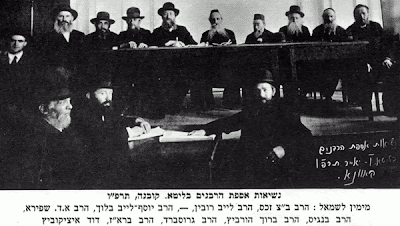Sunday, June 29, 2008
Pre-war Warsaw Video IN COLOR!
http://resources.ushmm.org/film/display/main.php?search=simple&dquery=Pre-war+Jewish+Life&cache_file=uia_DbcMRf&total_recs=98&page_len=25&page=3&rec=58&file_num=4911
Another neat video: Warsaw and Cracow
http://resources.ushmm.org/film/display/main.php?search=simple&dquery=Synagogue&cache_file=uia_AatmCi&total_recs=47&page_len=25&page=2&rec=28&file_num=4354
Very neat video of post-war Tel Aviv Rabbinate, etc.
http://resources.ushmm.org/film/display/main.php?search=simple&dquery=Synagogue&cache_file=uia_gmDqzB&total_recs=47&page_len=25&page=1&rec=18&file_num=1832
Another Rare Rabbinic Photo!
Rare Rabbinic Photo!
Friday, June 27, 2008
Fascinating Snapshots of the early JO
(BTW, I have pretty much a complete collection of early JO's - HTC gave me their duplicates that they were on the verge of discarding. Was zocheh in similar fashion to an almost complete set of Ha'Ma'ayan's.
Wednesday, June 25, 2008
"TIDE-ings"
From an email synopsis I received (read the full essay at the link above):
Rav Mantel's declaration, which angered many in the community, came at a sit-down kiddush at Dr. Raphael Moller Hall in Washington Heights after Shabbos morning services. He said that only Rav Hirsch, a great man who knew the fine boundaries between what is religiously permissible and what is prohibited, could make Torah Im Derech Eretz workable.
Our generation, he said, must follow today's gedolei HaTorah (great Torah leaders).
After Shabbos, Dr. Eric Erlbach, KAJ president for over two decades, resigned.
Sunday, June 22, 2008
Wednesday, June 18, 2008
Tuesday, June 17, 2008
Uncle Ezra?!
http://www.jewishjournal.com/articles/item/the_torah_a_moral_compass_20000714/
Friday, June 13, 2008
Wednesday, June 11, 2008
Thursday, June 05, 2008
Tuesday, June 03, 2008
Shavuos
The Maharal (Tiferes Yisroel chap. 27) gives us a startling answer:
אמנם מה ששואלים בני אדם כי אם חג השבועות הוא בשביל שנתן לנו התורה, למה כתב (במדבר כ"ח) וביום הבכורים בהקריבכם מנחה ולא כתב ביום מתן תורה מאחר שעיקר היום טוב הוא בשביל התורה, כמו שאנו אומרים זמן מתן תורתנו, אין זה שאלה כלל כי השם יתברך נתן למועדים זמן אשר הם שמחת ישראל אשר זכו אל הטוב כמו שאמר בחג המצות שבו יצאו ישראל מבית עבדים וסוכות כי בסוכות הושבתי אתכם וביום הכפורים כי ביום הזה יכפר עליכם, ובחג השבועות התורה שנתנה בו נתנה מהשם יתברך והיא לעול על ישראל והרי אומות העולם לא היו רוצים לקבל התורה ואף כי אנו אומרים זמן מתן תורתנו היינו משום שקבלנו התורה בעצמנו ואמרנו נעשה ונשמע אבל מכל מקום השם יתברך הנותן התורה היה כופה ההר עליהם שיקבלו התורה בעל כרחם מפני שהיא עול עליהם ואיך יכתוב בתורה זמן מתן תורה שנתן השם יתברך בגזרתו על האדם. ומזה הטעם לא נכתב גם כן בראש השנה הטעם שהוא יום הדין מפני כי הדין מצד עצמו אינו מקובל ואינו נוח לאדם ולכך לא תלה המועד בזה רק נכתב זכרון תרועה והזכירה שנזכר על ידי תרועה לפני הקדוש ברוך הוא לטובה, וכן הוא הזכירה בכל מקום. ותלה שלש מועדים הפסח בחדש האביב ושבועות חג הקציר וסוכות חג האסיף, ועוד יתבאר ענין אלו שלשה זמנים אל המועדים השלשה. והתבאר לך מה שלא קבע זמן חג השבועות שבו נתנה תורה לישראל:
In other words, as we were compelled to accept the Torah at Sinai, and because it imposes upon us a heavy yoke, with so many burdensome laws and potential punishments, its Giving would be a reason to be upset, not happy! The Torah therefore concealed the character of Shavuos as the commemoration of that event, and highlighted instead its happier character, as the time at which the first fruits begin to appear on the trees of the Land of Israel.
Our great Moreh Derech in Mussar and Avodas Hashem, Rabbi Yisroel Salanter (Ohr Yisroel #23) makes a similar point and expands upon it. He adds that it is for this reason that when the Torah discusses the simchah of Shavuos at the end of Parashas Re'eih, it writes וזכרת... את החקים האלה – that we remember these chukim – laws that do not possess an apparent rationale – for in light of this approach the simchah of Shavuos is, indeed, a chok. [For the lamdanim among us, this approach is medukdak in Rashi, Pesachim 68b: הכל מודים בעצרתדבעינן נמי לכם - שישמח בו במאכל ומשתה, להראות שנוח ומקובל יום זה לישראל שנתנה תורה בו.]
It would seem difficult that such giants, who lived and breathed Torah, and who surely derived from it great joy – as we do to this very day – should make such a stark statement concerning Shavuos!
Perhaps we might explain this enigma via a simple tzvei dinim: There is a distinction between one who stands “outside” the Torah and perceives it as a novice, and one who has experienced Torah on the “inside” - partaking of its sweet and pleasant substance. Shavuos commemorates the giving of the Torah – when we received the Torah as “outsiders” and “novices.” It therefore seemed depressingly complex and demoralizing. However, once we tasted of that concerning which it says כי הם חיינו ואורך ימינו, and טעמו וראו כי טוב ה, we came to love the Torah and rejoice in our acquisition of it.
Rabbi Avrohom Eliyahu Kaplan gives another answer to the original question. He bases it on an example from the “real world.” When a happy couple's anniversary is due to take place, each spouse waits to see if the other one remembers the significance of the date. To need to remind one's “other half” is to feel neglected and unloved. One may drop some hints, but not more! As Shavuos is the anniversary of our “marriage” with Hashem at Sinai, Hashem awaits to see whether we remember the momentous character of the 50th day of the Omer. He drops us hints – such as making the date the day of the Bikkurim – but puts the responsibility of remembering the full nature of Shavuos upon us. And, of course, like a good spouse, the Jewish nation (for the most part), has adopted the custom of “giving flowers” - by adorning our Shuls with foliage.
May we be zocheh to demonstrate our devotion to Hashem on Shavuos – and throughout the year as well!
Depicting your yeshiva years on a resume...
How do you describe your Yeshivah Education on a resume?
It seems to me, that ten years of Beis Medrash and Kollel could be
played up on a resume. We are talking about intensive study 10-12 hours
a day. Analyzing Talmud, studying Mussar and foreign language skills.
How would you explain it on a resume or in an interview?
I responded:
I would say X years of training in creative thought, both abstract
and concrete, with special attention to taking the thinking to the
stage of practical applications. Extensive studies in business and
ancillary ethics. Development of capacity to function in multilingual
and high-pressure situations. How's that!?









